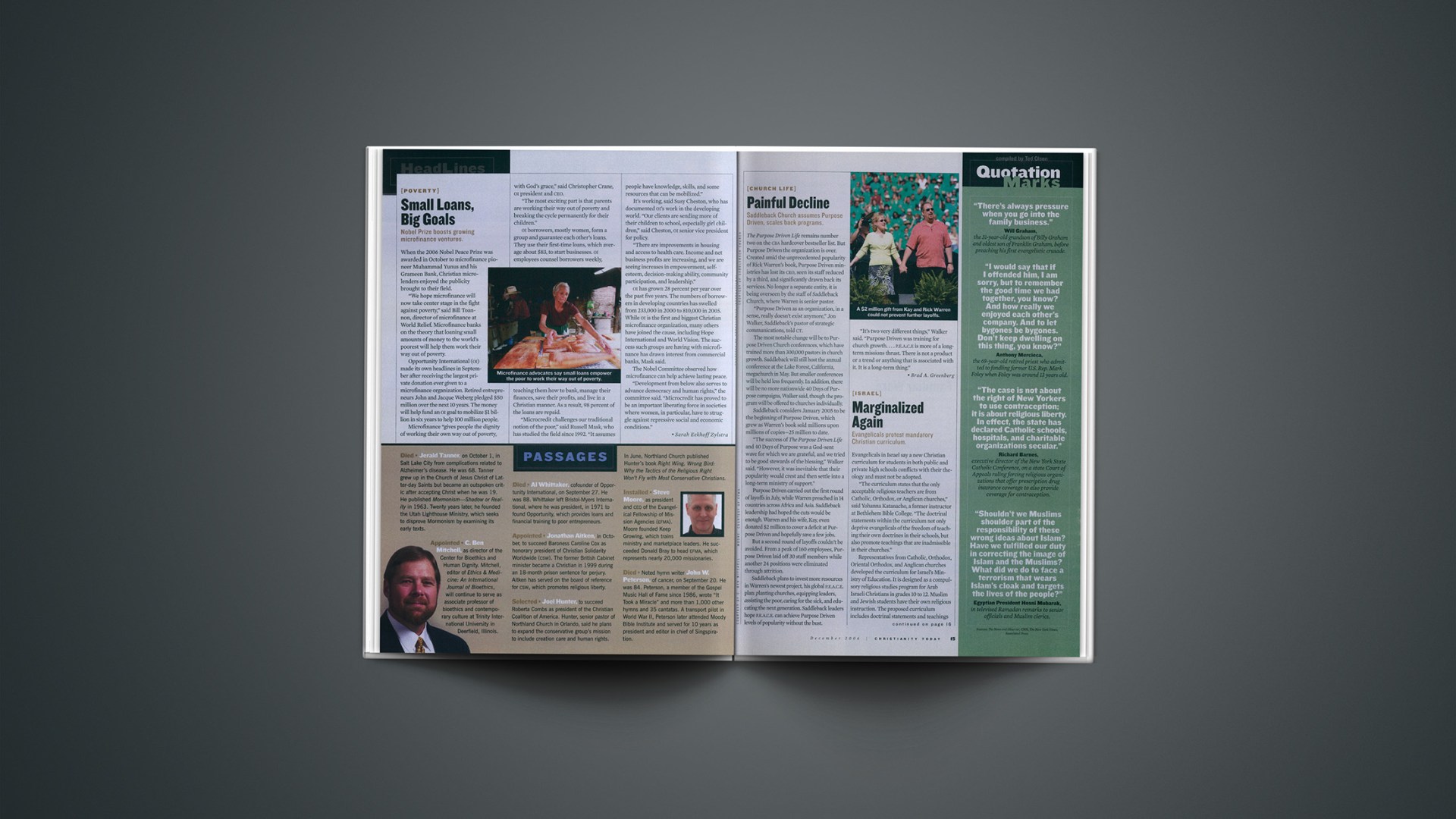When the 2006 Nobel Peace Prize was awarded in October to microfinance pioneer Muhammad Yunus and his Grameen Bank, Christian micro-lenders enjoyed the publicity brought to their field.
“We hope microfinance will now take center stage in the fight against poverty,” said Bill Toannon, director of microfinance at World Relief. Microfinance banks on the theory that loaning small amounts of money to the world’s poorest will help them work their way out of poverty.
Opportunity International (OI) made its own headlines in September after receiving the largest private donation ever given to a microfinance organization. Retired entrepreneurs John and Jacque Weberg pledged $50 million over the next 10 years. The money will help fund an OI goal to mobilize $1 billion in six years to help 100 million people.
Microfinance “gives people the dignity of working their own way out of poverty, with God’s grace,” said Christopher Crane, OI president and CEO.
“The most exciting part is that parents are working their way out of poverty and breaking the cycle permanently for their children.”
oi borrowers, mostly women, form a group and guarantee each other’s loans. They use their first-time loans, which average about $83, to start businesses. OI employees counsel borrowers weekly, teaching them how to bank, manage their finances, save their profits, and live in a Christian manner. As a result, 98 percent of the loans are repaid.
“Microcredit challenges our traditional notion of the poor,” said Russell Mask, who has studied the field since 1992. “It assumes people have knowledge, skills, and some resources that can be mobilized.”
It’s working, said Susy Cheston, who has documented OI’s work in the developing world. “Our clients are sending more of their children to school, especially girl children,” said Cheston, OI senior vice president for policy.
“There are improvements in housing and access to health care. Income and net business profits are increasing, and we are seeing increases in empowerment, self-esteem, decision-making ability, community participation, and leadership.”
oi has grown 28 percent per year over the past five years. The numbers of borrowers in developing countries has swelled from 233,000 in 2000 to 810,000 in 2005. While OI is the first and biggest Christian microfinance organization, many others have joined the cause, including Hope International and World Vision. The success such groups are having with microfinance has drawn interest from commercial banks, Mask said.
The Nobel Committee observed how microfinance can help achieve lasting peace.
“Development from below also serves to advance democracy and human rights,” the committee said. “Microcredit has proved to be an important liberating force in societies where women, in particular, have to struggle against repressive social and economic conditions.”
Copyright © 2006 Christianity Today. Click for reprint information.
Related Elsewhere:
The Global Microcredit Summit in Canada has also brought publicity to the issue and to Opportunity International.
The summit wrapped up Friday afternoon.
The Norwegian Nobel Committee announced the Peace Prize winner on October 13, 2006.
A BBC article on the Nobel announcement says that many were surprised.
The Washington Post reported on Yunus’ reaction to the Nobel announcement.
“Lessons from the Poor” explains why giving the award to an organization that encourages entrepreneurship is significant.
PBS has a transcript of an interview with Muhammad Yunus
A preview of “A Hand Up is Not Always a Handout” by Yunus is available at the Wall Street Journal.
Opportunity International congratulated Muhammad Yunus on the Nobel Peace Prize.
Christian Century also noted that the peace prize has drawn attention to Opportunity International.
Business Week has an article which mentions Opportunity International’s work in Malawi
PBS has an article on the history of microfinancing
The Economist writes on the pros and cons of microlending in “The Hidden Wealth of the Poor.”
An economist writes that the “year of microcredit” may have hurt more than helped.
The Association of Evangelical Relief and Development Organizations has a paper on Microenterprise Development and links to Christian development organizations that implement MED.
John and Jacque Weberg’s record-breaking $50 million pledge to Opportunity International also drew attention to the organization.
Transformation has an issue on Christian microenterprise development.










